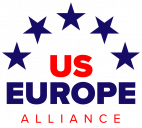“The revisionist powers of China and Russia… are actively competing against the United States and our allies and partners. [They] want to shape a world antithetical to U.S. values and interests.”
After the demise and disintegration of the Soviet Union, the people of Russia quickly found themselves victims of corruption and oligarchy in a society brutally dominated by naked self-interest.
On a false promise of order and restored dignity, Vladimir Putin became president of the Russian Federation over 25 years ago. During his first term, Putin stated that the collapse of the Soviet Empire was “the greatest geopolitical catastrophe of the century.” In a return to history, Putin waited until he’d sufficiently consolidated power at home before renewing Kremlin-directed efforts to weaken the Transatlantic Alliance, together with the security and prosperity it fostered and must ardently protect.
Vladimir Putin’s Russia remains an adversary seeking to divide and extinguish the light of freedom that the Transatlantic Community has paid dearly to preserve, over one hundred years, through war and peacetime. However, in 2025, the dynamics of this adversarial relationship have shifted significantly under the second Trump administration. The U.S. has pivoted toward normalizing relations with Russia, a stark departure from previous policies of isolation, as evidenced by high-level talks in Saudi Arabia and agreements to restore diplomatic missions. This shift has created a rift within the Transatlantic Alliance, with European allies expressing alarm over the U.S. aligning with Russia on issues like the Ukraine conflict, including voting against a UN resolution condemning Russia’s actions in February 2025.
Under Putin’s direction, the Kremlin continues to sow poisonous seeds of doubt and confusion in Western societies to weaken our common belief in ourselves, pursuing a grand strategy to divide Europeans and Americans despite our decades of cooperation, trust, and shared sacrifice. Tactically, this involves the ongoing invasion of Ukraine—now in its third year of full-scale conflict—cyberattacks against Baltic states and other allies, the use of energy resources for political manipulation, and calculated efforts to toxify politics in the open societies of the West. Meanwhile, Russia has capitalized on the U.S. policy shift, with the Kremlin positiioning itself well in Ukraine ceasefire talks and potential U.S. business re-entry into Russian markets, further straining transatlantic unity. Until Putin or his successor ceases these actions and demonstrates a commitment to international norms, Moscow will remain a profound challenge to America and Europe’s shared values and common interest in a secure and economically prosperous community, necessitating a cautious and unified transatlantic response to counter Russia’s destabilizing influence.

